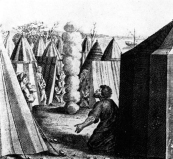God is With Us: His Best Promise

On the way to the Promised Land, he wasn’t the only one who was angry. God was ready to wipe out the entire lot of them and start again. One of Moses’ most significant acts was to intercede for the foolish tribes of Israel so that they could continue to make the journey.
But then God let Moses in on another great loss—He would no longer go with them. That cloud by day and fire by night through which God manifested Himself would no longer be around. Oh, He would send an angel, but His manifest presence would be unavailable.
Once again Moses unashamedly begged, and God graciously relented. Yet Moses made sure he said this to God, to summarize his feelings:
“If Your presence does not go with us, do not lead us up from here. For how then can it be known that I have found favor in Your sight, I and Your people? Is it not by Your going with us, so that we, I and Your people, may be distinguished from all the other people who are upon the face of the earth?” (Exodus 33:15-16).
The presence of God—There is nothing else as important.
Moses already knew that God was everywhere, or omnipresent. But he was asking for the commitment of God to His people, His promise that He would oversee their travels and troubles—a continual presence guiding, instructing, caring.
God did go with them, but sadly, judgment was still in the picture for rebellious Israel.
Fast forward about 2000 years. The disciple Matthew is writing his now famous rendition of Jesus’ life and ministry. He isn’t writing a letter, answering questions or squaring off on issues like the later Paul the apostle would do. Rather, he is writing literature. Historical literature, for sure, but writing with an agenda. He selects those aspects of Jesus’ life that show the authority or kingship of Jesus especially. But the superb gospel of Jesus that he wrote has some amazing bookend statements about this Jesus. We call them an “inclusio.”
First, at the birth of Christ Matthew reminds us that this baby is to be called Emmanuel. This is a name, like so many names of that day, which had special meaning. It meant, “God with us.” This means that Christ’s coming was a visitation of God Himself in the person of His Son. When you see the Son, you see the Father, for they are the same in essence, though taking on distinct roles for the sake of redemption.
When Matthew ends his famous letter, He describes Christ, now resurrected and soon to be ascended. The Savior is speaking to His disciples in what we have come to call, “The Great Commission.” The promise He makes is profound. “And lo, I am with you always, even to the end of the age.”
Not just His presence for judgment, or even the gift of God in human form to the world—rather, this promise is about the presence of God in Christ only for believers. It is a promise that will carry His disciples through suffering and hardship for the gospel, and death itself.
“I am with you” was enough. “I am with you” answered all their needs. It took the disciples, and will take us, to the end.
But what’s beyond that? Interestingly, there is more after the “inclusio” of Matthew. Paul tells us an even better promise yet to be fulfilled by Christ.
For the Lord Himself will descend from heaven with a shout, with the voice of the archangel and with the trumpet of God, and the dead in Christ will rise first. Then we who are alive and remain will be caught up together with them in the clouds to meet the Lord in the air, and so we shall always be with the Lord. (1 Thessalonians 4:16-17)
One day, for Christians only, we will rise to meet the Lord. I won’t go into details about what follows, for there are several views. However, one thing is sure. When the Lord comes we will meet Him and from that point on, “we shall always be with the Lord.”
In the new earth (Revelation 21) for a period that will not end, the Lord will be with us without the filter and disruption of sin or the limitations of human understanding. The most exciting thing about the future is that we will enjoy His presence in a changed body for eternity. “God is with us” takes on more meaning then.

